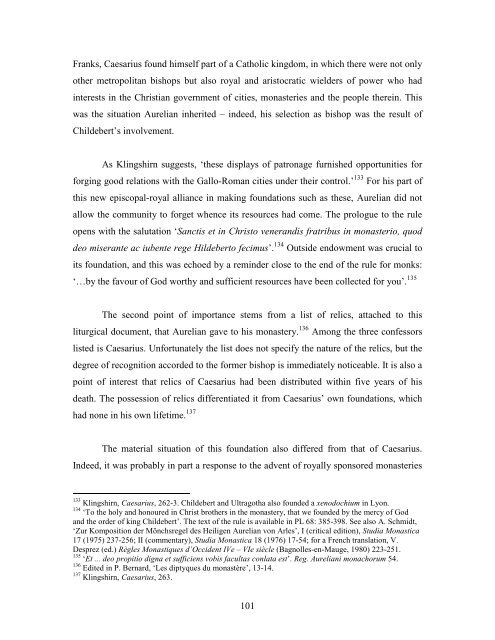Lindsay Rudge PhD Thesis - University of St Andrews
Lindsay Rudge PhD Thesis - University of St Andrews
Lindsay Rudge PhD Thesis - University of St Andrews
Create successful ePaper yourself
Turn your PDF publications into a flip-book with our unique Google optimized e-Paper software.
Franks, Caesarius found himself part <strong>of</strong> a Catholic kingdom, in which there were not only<br />
other metropolitan bishops but also royal and aristocratic wielders <strong>of</strong> power who had<br />
interests in the Christian government <strong>of</strong> cities, monasteries and the people therein. This<br />
was the situation Aurelian inherited – indeed, his selection as bishop was the result <strong>of</strong><br />
Childebert’s involvement.<br />
As Klingshirn suggests, ‘these displays <strong>of</strong> patronage furnished opportunities for<br />
forging good relations with the Gallo-Roman cities under their control.’ 133 For his part <strong>of</strong><br />
this new episcopal-royal alliance in making foundations such as these, Aurelian did not<br />
allow the community to forget whence its resources had come. The prologue to the rule<br />
opens with the salutation ‘Sanctis et in Christo venerandis fratribus in monasterio, quod<br />
deo miserante ac iubente rege Hildeberto fecimus’. 134 Outside endowment was crucial to<br />
its foundation, and this was echoed by a reminder close to the end <strong>of</strong> the rule for monks:<br />
‘…by the favour <strong>of</strong> God worthy and sufficient resources have been collected for you’. 135<br />
The second point <strong>of</strong> importance stems from a list <strong>of</strong> relics, attached to this<br />
liturgical document, that Aurelian gave to his monastery. 136 Among the three confessors<br />
listed is Caesarius. Unfortunately the list does not specify the nature <strong>of</strong> the relics, but the<br />
degree <strong>of</strong> recognition accorded to the former bishop is immediately noticeable. It is also a<br />
point <strong>of</strong> interest that relics <strong>of</strong> Caesarius had been distributed within five years <strong>of</strong> his<br />
death. The possession <strong>of</strong> relics differentiated it from Caesarius’ own foundations, which<br />
had none in his own lifetime. 137<br />
The material situation <strong>of</strong> this foundation also differed from that <strong>of</strong> Caesarius.<br />
Indeed, it was probably in part a response to the advent <strong>of</strong> royally sponsored monasteries<br />
133 Klingshirn, Caesarius, 262-3. Childebert and Ultragotha also founded a xenodochium in Lyon.<br />
134 ‘To the holy and honoured in Christ brothers in the monastery, that we founded by the mercy <strong>of</strong> God<br />
and the order <strong>of</strong> king Childebert’. The text <strong>of</strong> the rule is available in PL 68: 385-398. See also A. Schmidt,<br />
‘Zur Komposition der Mönchsregel des Heiligen Aurelian von Arles’, I (critical edition), <strong>St</strong>udia Monastica<br />
17 (1975) 237-256; II (commentary), <strong>St</strong>udia Monastica 18 (1976) 17-54; for a French translation, V.<br />
Desprez (ed.) Règles Monastiques d’Occident IVe – VIe siècle (Bagnolles-en-Mauge, 1980) 223-251.<br />
135 ‘Et ... deo propitio digna et sufficiens vobis facultas conlata est’. Reg. Aureliani monachorum 54.<br />
136 Edited in P. Bernard, ‘Les diptyques du monastère’, 13-14.<br />
137 Klingshirn, Caesarius, 263.<br />
101

















